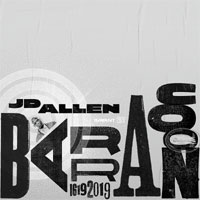JD Allen • Barracoon 1619–2019
 he shockwave set off at the Village
Vanguard on November 3, 1957 keeps resounding. That evening Sonny Rollins, Wilbur Ware and
Elvin Jones (recording for Blue Note) canonized a new format Sonny had been exploring: the
tenor saxophone/bass/drums trio, a little unit with nowhere to hide. It puts pressure on a
tenor player. The modern proponent JD Allen shares a few traits with Rollins in his trio
prime: a big resonant tenor sound, sometimes heard in dialogue with drums, and a
willingness to stick his neck out musically or even politically. Rollins named a 1958 trio
album The Freedom Suite, with a liner note spelling out the title’s
implications. The title of JD Allen’s Barracoon 1619–2019 commemorates
the 400th anniversary of the first enslaved Africans arriving on what would become US
shores. His liner notes say the pieces included were affected by the state of our own
world: "These particular vehicles of expression fit the bill for me to have a good
scream and a good cry." he shockwave set off at the Village
Vanguard on November 3, 1957 keeps resounding. That evening Sonny Rollins, Wilbur Ware and
Elvin Jones (recording for Blue Note) canonized a new format Sonny had been exploring: the
tenor saxophone/bass/drums trio, a little unit with nowhere to hide. It puts pressure on a
tenor player. The modern proponent JD Allen shares a few traits with Rollins in his trio
prime: a big resonant tenor sound, sometimes heard in dialogue with drums, and a
willingness to stick his neck out musically or even politically. Rollins named a 1958 trio
album The Freedom Suite, with a liner note spelling out the title’s
implications. The title of JD Allen’s Barracoon 1619–2019 commemorates
the 400th anniversary of the first enslaved Africans arriving on what would become US
shores. His liner notes say the pieces included were affected by the state of our own
world: "These particular vehicles of expression fit the bill for me to have a good
scream and a good cry."
His best compositions sing with that kind of blood-deep righteous authority. The opener, "Barracoon," ascends from a riff that starts in the belly of the horn, establishing the size of his sound; then the written line volleys between upper and lower registers with a staccato attack, a template the composer can (and does) develop a solo from. Allen’s tunes often contain some memorable nugget of melody, one that might recall a kids' song or field holler. (Even lesser tunes like "13" and "Ursa Major" slip in earwormy phrases.) It’s practical music: just dipping back into the propulsive hook is enough to renourish a solo in midstream. Allen can stretch those shapes in pitch and time. "The Goldilocks Zone"’s opening shout builds in that taffy-like malleability. It’s a phrase readymade for a hollering farmer or the Count Basie band, and the way it seems to hold back the time a little builds resistance into the beat, inspiring a jaunty feel that hints at the broken-field swing of Ornette Coleman, who knew something about stretching blues tonality and conceptions. Allen pointedly folds a few Ornetty (and field-hollery) phrases into "The Immortal (H. Lacks)," where the tenor testifying gets deepest. "Communion" likewise has that Ornette-informed bounce -- a melody with a lot of agreeable leaping fifths, which is played by bass on the opening chorus, before the tenor’s delayed entrance. Allen’s tenor sound has ripened since he started his celebrated former trio with bassist Gregg August and drummer Rudy Royston. Now, after a dozen years, he’s replaced those increasingly busy players with up-and-coming Ian Kennselaar and Nic Cacioppo, not (yet) as confidently ferocious as their forebears but no slackers either. Drummer Cacioppo, ever alert, percolates on the skins, shadowing tenor phrasing, under a blaze of cymbals. Kennselaar hooks his bass in with the drums’ low end, adding a more tonal percussive line, though he might pull against the momentum to stir things up. The sound of this recording is fine and frill-free: tenor front and center at the prow of an equilateral triangle, drums and bass close behind. They were recorded in isolation, but the mix pours them back into a small space, an imaginary club stage. The tenor isn’t too closely miked; there’s room for its sound to bloom and fill the air. (The esteemed Mike Marciano engineered.) Allen’s earthy tunes can be tricky, like "EYE Scream," with its start/stop energy and momentum, and there are occasional laggard moments among the fireworks. (Tracks average about six minutes.) Maybe to differentiate the new trio from its predecessor, on three tracks Kennselaar plays thuddy electric bass, meandering out of the trio mind meld. Electric bass sounds particularly off on the plaintive "The Immortal (H. Lacks)" -- H. as in Henrietta, a title referencing a more recent violation of African-American autonomy. A generation or more ago, tenor players recording in trio
would tip their hats to Rollins in some kind of way. Allen ending this original program
with an unironic "When You Wish Upon a Star" may nod to Sonny’s penchant
for corny tunes he sincerely loved. But there’s no explicit wink in his direction.
Invoking Rollins, tenor players invite a tough comparison. But then Sonny hasn’t
often hit that mark himself, after leaving trios behind in the late 1960s. |
